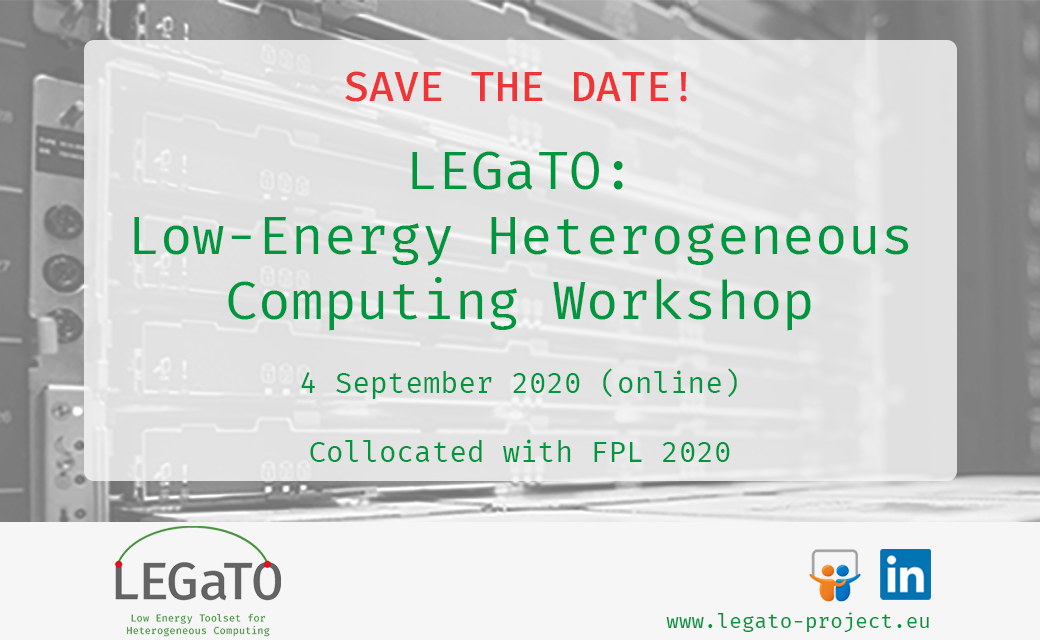Events
LEGaTO Final Event: Low-Energy Heterogeneous Computing Workshop
Recording of the workshop is available here.

The LEGaTO final event, titled "LEGaTO: Low-Energy Heterogeneous Computing Workshop" and collocated with FPL2020, will be held virtually on Friday 4 September 2020.
LEGaTO is a three-year H2020 project on developing a toolset for low-energy heterogeneous computing that also considers fault tolerance, programmability and security. The project optimized a number of use cases for low-energy. The objective of the workshop is to apply the optimization low-energy techniques to other stakeholders in each of the use cases.
Scope
We are broadly looking to engage the Artificial Intelligence, Smart City, Smart Home, Healthcare and IOT communities to evangelize the low-energy optimization techniques that we have developed for these communities during the lifetime of the LEGaTO project. In particular, we will showcase how the heterogeneous low-energy small form-factor hardware could be coupled to an energy efficient runtime to produce one order of energy savings across these use cases. The workshop will consist of invited talks from these communities and will include insights gained during the project for ensuring fault-tolerance and security in addition to energy efficiency.
Registration
Registration is now closed.
Programme
Friday 4 September 2020 (CEST)
| 9.45-10.00 | Opening remarks and LEGATO Introduction by Osman Unsal (BSC) |
| 10.00-10.30 |
Keynote talk Stephan Diestelhorst (Xilinx): The Accelerator Conundrum - and three sketches to solve it |
| 10.30-11.15 |
Session 1: Energy Efficiency Chair: Jens Hagemeyer (Bielefeld University) Abstract: Information and Communication Technology (ICT) is forecasted to global electricity usage by 2030 was estimated at 21% in a likely scenario and 51% in the worst-case. This bleak outlook requires the ICT sector to take urgent and radical action to limit the energy consumption of the sector. This session will look at unconventional means to achieve this goal. All market segments of the ICT area from Supercomputers to Embedded HPC systems will need to be radically energy-efficient; these two cases will be highlighted in the session. Dimitris Gizopoulos (University of Athens): Energy Efficiency in Multicore CPUs: Harnessing Voltage Margins Oscar Palomar (BSC): Energy efficiency opportunities with long vector architectures Nils Kucza (Bielefeld University): Smart Home - AI at the edge |
| 11.15-11.30 | Comfort break |
| 11.30-12.15 |
Session 2: Fault Tolerance and Security Chair: Leo Bautista (BSC) Abstract: With the scaling of technology node to 6-7 nanometers, transistors are becoming more susceptible to transient and permanent errors. On the other hand, security lapses are making it very challenging to patch hardware/software of ICT systems. This session will look into fault-tolerance and security challenges facing datacenters and embedded systems. Paulo Verissimo (University of Luxembourg): Resilient distributed systems-on-a-chip: the recipe for platform security and dependability Jaume Abella (BSC): Resilient high-performance and low-power platforms for safety-critical real-time Systems Christof Fetzer (TU Dresden): Ensuring consistency in the face of failures and attacks |
| 12.15-13.00 |
Session 3: AI and Smart City / Smart Home Chair: Micha vor dem Berge (Christmann IT) Abstract: The proliferation of edge and fog computing and the availability of data generated by zero emissions electric vehicles and smart home automation have driven the ICT industry to provide AI-driven solutions for these use cases. In this session we will discuss the convergence of HPC and AI in smart city/home market segments. Mariano Lamarca (Barcelona City Council): Smart Cities Services Evolution Francisco Ramírez (Bettair Cities): Assimilation of real-time data from secondary air pollution monitoring networks into air pollution modeling algorithms Anders Logg (Chalmers University of Technology): Digital Twin Cities Centre |
| 13.00-14.00 | Lunch break |
| 14.00-14.45 |
Session 4: FPGAs and Programming Models Chair: Miquel Pericàs (Chalmers University of Technology) Abstract: FPGAs have become an attractive compute fabric which offers almost ASIC class performance per watt. However, their progammability had been an issue that impacted their take-up by more use cases. Recently, FPGAs have become easier to program as well as providing leadership class performance per watt. This sesssion will discuss recent FPGA developments in energy-efficiency and programmability. Dirk Koch (University of Manchester): Operating Systems for FPGAs - Why and How? Miriam Leeser (Northeastern University): FPGA's at the Edge: Efficient 5G Communication and Security Considerations Tobias Becker (Maxeler Technologies): Infection Research with Maxeler Dataflow Computing |
| 14.45-15.30 |
Poster session (LEGaTO students) Chair: Behzad Salami (BSC) Posters and presentation recordings are available here. |
| 15.30-15.45 | Comfort break |
| 15.45-16.30 |
Session 5: EU related projects Chair: Marcelo Pasin (Université de Neuchâtel) Eduardo Quiñones (BSC): The ELASTIC project: A Software Architecture for Extreme-Scale Big-Data Analytics in Fog Computing Ecosystems Filippo Cugini (CNIT): BRAINE project - Big data pRocessing and Artificial Intelligence at the Network Edge: overview and use cases John Davis (BSC): eProcessor: European, extendable, energy- efficient, extreme-scale, extensible, Processor Ecosystem |
| 16.30-17.00 | Wrap-up and conclusions |

